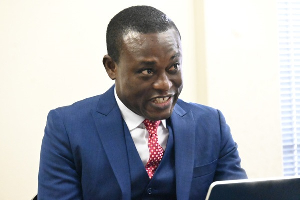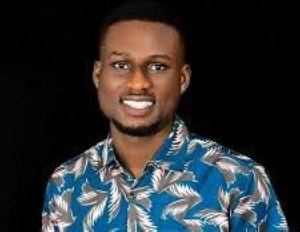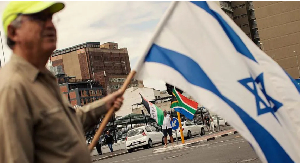When Patrick Williams told his mother he was gay, she packed his bags and threw him out of the house, disowning her son for what she saw as an evil act.
The 21-year-old Ghanaian had known he was gay since he was 13, but had hesitated to tell anyone.
"I was scared and I knew in our society, it was not accepted. It was best for me to keep it inside until I saw someone who was similar," he said.
When a schoolmate told his mother of rumours that the 18-year-old Patrick was having sex with another boy, he admitted he was gay.
"She said because of what I chose to be, I was no longer her son. Was the whole world against me? This was the biggest question in my mind. My own mother sometimes says she wishes I was dead," he said.
His experience is by no means unusual in the West African country, where homosexuality is seen as an unnatural sexual act and, as such, is illegal.
But as the country celebrates 50 years of independence, UK gay rights activist Peter Tatchell is calling on President John Kufuor, who is visiting London this week, to speak to his country's gay community.
"As Ghana celebrates 50 years of independence, it is time to repeal the anti-gay laws," Mr Tatchell said.
"There will be attempts to get a letter to President Kufuor urging an end to the persecution of gays and lesbians in Ghana. In particular, we want the Ghanaian government to open a dialogue with gay and lesbian groups," he added.
"Unique people"
In deeply religious Ghana, homosexuality is seen as an imported foreign lifestyle choice and a moral aberration.Last year, a proposed gay and lesbian conference was banned.
"Ghanaians are unique people whose culture, morality and heritage totally abhor homosexual and lesbian practices and indeed any other form of unnatural sexual acts," Information Minister Kwamena Bartels said in a statement banning the conference.
Gay marriage may be legal in South Africa, but across the continent many devout and traditional Africans view homosexuality with horror.
There are gay bars in Accra and some organisations do work with the gay community, raising awareness about HIV/Aids, but mostly their work is underground.
Cost of intolerance
For individuals such as Patrick, the personal cost of intolerance is huge."It hurts me a lot. I love my mum so much, I think of her each day. When I try to contact her, she is rude to me. This has taken me away from her," he said.
Such is the opprobrium that homosexuality attracts that even normally vociferous Ghanaian human rights organisations are subdued in their support for gay rights.
"In the first place, I do not know if I want to promote homosexuality in Ghana," said Richard Quayson, deputy commissioner of the Commission on Human Rights and Administrative Justice, the country's leading human rights organisation.
"As a human rights organisation, if someone comes forward and says their rights are violated, it is my duty to protect them. As a Ghanaian, I don't think I can openly go out and promote it in the country," he said.
In the experience of 23-year-old Joseph Hilary Afful, people do make their disapproval clear, sometimes in violent ways.
Pointing to scars on his forehead, he describes how he and four friends were attacked last August in an Accra suburb, Chorkor.
"We have to hide ourselves if even walking in the afternoon, someone can throw stones at you," he said.
Few in Ghana are willing to take the political risk of advocating tolerance, said Gabby Otchere-Darko, the editor of Ghana's Statesman paper.
"Even those who control the media are not willing to be tolerant to views that are sympathetic to homosexuality. That is the biggest problem," he said.
"We need to accept there are certain things there is no point in policing."
Ghanaian laws prohibit unnatural carnal acts - a definition which is widely understood to include homosexuality although in practice, few have been prosecuted for homosexual acts.
Secret sexuality
But in this environment, it is little surprise that some choose to keep their sexuality secret, sometimes even from their closest relatives.Rose, 26, has yet to tell her mother she is gay and does not want her family name to be published.
"My mum asks me if I have boyfriends, I always lie to her and say yes," she said.
For others, their identity is quite simply something which should not be hidden.
"I think they should accept who we are. Nobody came to earth to learn gay life. We were born with it. It is not about having sex. It is two men in love. They should look at that side of it," said Joseph.













